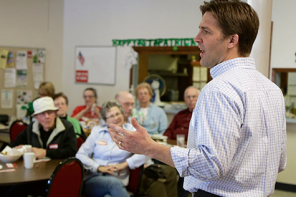Ten Questions for Paul Froese on The Plot to Kill God: Findings from the Soviet Experiment in Secularization (University of California Press, 2008)
RD: What inspired you to write A Plot to Kill God? What sparked your interest?
It is interesting that the idea of the supernatural and, more specifically, the idea of God is a fundamental cultural element common to all modern societies, so common as to make it a core belief from which a multitude of radically divergent worldviews spring. Soviet leaders sought to undermine this basic fact with an emerging atheist campaign, a “plot to kill God.” In doing so, Marxist-Leninists were forced to consider deep philosophical questions concerning human nature, the necessity of religious faith to the human condition, and the social sources of religiosity. Because these questions also interest me, I was inspired to investigate the “Soviet Secularization Experiment” to gain insights into the universality of belief in God and how religion and politics, even in conflict, closely inform one another.
What’s the most important take-home message for readers?
It is easier to invoke God than to get rid of Him. This is one simple yet important conclusion I draw from the prolonged and often vicious experiment to eradicate religion from Soviet society. Communist leaders in the Soviet Union attempted something never considered by earlier rulers, be they emancipators or tyrants. For the first time in history, rulers of a modern state hoped to expunge not only the existence of religious institutions but also daily expressions of spirituality and, most dauntingly, belief in a supernatural realm. Religion has often been used by political rulers to justify their self-interests or validate the status quo. Religion has also been used by social activists to motivate protest movements and inspire passions for social change. Throughout history, social and civic leaders often, and many times quite successfully, attempt to show that God is on their side; in other words, politicians naturally tend to utilize pre-established religious traditions to bolster their political legitimacy (just think how often US presidential candidates invoke faith!). But never before had political authorities attempted to justify their rule and motivate their citizens through an appeal to atheism. The results of this massive Soviet Secularization Experiment demonstrate that while the idea of God often provides political legitimation, earthly powers can do little to unseat the idea of an otherworldly sovereign.
Anything you had to leave out?
Too much to mention.
What are some of the biggest misconceptions about your topic?
I have encountered two general misconceptions. First, that I have a political agenda by bringing attention to the atrocities of the Soviet Union. Far from it, I believe that liberals and conservatives alike should be able to objectively understand that the Soviet government killed a lot of people and prevented a lot of people from freely expressing their beliefs. Second, that I have a religious agenda by pointing out the political importance of religion. Again, I never suggest that religion is “better” than non-belief or atheism; rather, I simply demonstrate that religious faith continues to be a powerful force in the modern world. And this point can be accepted by even the most convinced atheist. As Stalin was purported to say, “Religion is like a nail, the harder you hit it the deeper it goes!”
Did you have a specific audience in mind when writing?
I hope that I have written a book that is interesting and accessible to non-sociologists and non-historians. That said, my book is predominantly concerned with informing theoretical debates within the sociology of religion. But individuals generally interested in questions concerning human nature, the necessity of religious faith to the human condition, and the social sources of religiosity should enjoy my book without any background in sociology or Soviet history.
Are you hoping to just inform readers? Give them pleasure? Piss them off?
Popular wisdom warns that one should not discuss religion or politics in polite company. In my personal life, I try to follow this advice. Nonetheless, I have attempted a potentially impossible task—to write about religion and politics in a way that will not offend believers or non-believers, liberals or conservatives. My deepest hope is that all readers can gain something from this book and, at the very least, enthuse their own thinking about topics of faith, politics, and ideology.
What alternate title would you give the book?
I love the title and in full disclosure, the original title was terrible and my editor came up with “The Plot to Kill God.”
How do you feel about the cover?
I haven’t seen it yet—I hope it looks cool.
Is there a book out there you wish you had written? Which one? Why?
I certainly wish that I was a better writer and had keener insights. Still, I wouldn’t want to deprive anyone with better skills than me of his/her book—envy is a vice that when fed is insatiable.
What’s your next book?
I am finishing a book about images of God in the United States—what Americans think about God and how these beliefs affect American behaviors and attitudes. I am working with my collaborator Christopher Bader and we find that Americans have essentially four distinct types of God: 1) an Authoritative God, 2) a Benevolent God, c) a Critical God, and d) a Distant God. In our book, tentatively titled Who is Your God?, we explain these different theological views and show how they have shaped American culture and politics. Look for it from Oxford University Press in the summer of 2009.
Visit our RDBook page for a complete list of our interviews with authors…



